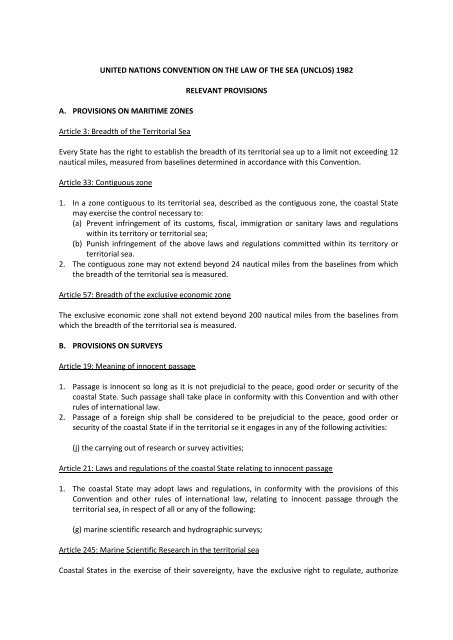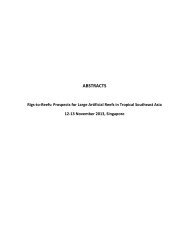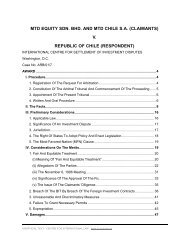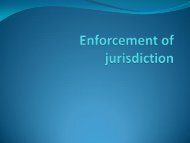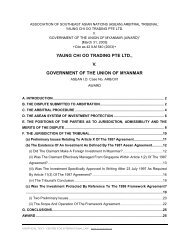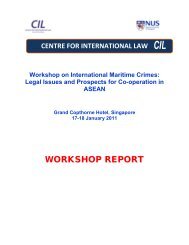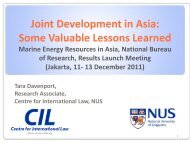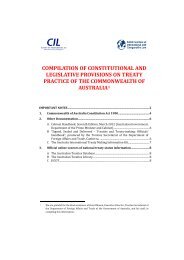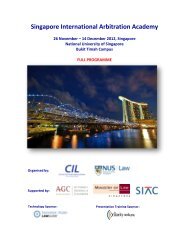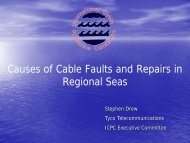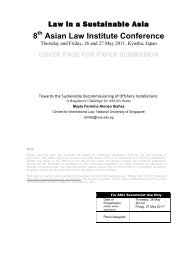UNCLOS - Centre for International Law
UNCLOS - Centre for International Law
UNCLOS - Centre for International Law
Create successful ePaper yourself
Turn your PDF publications into a flip-book with our unique Google optimized e-Paper software.
UNITED NATIONS CONVENTION ON THE LAW OF THE SEA (<strong>UNCLOS</strong>) 1982<br />
A. PROVISIONS ON MARITIME ZONES<br />
Article 3: Breadth of the Territorial Sea<br />
RELEVANT PROVISIONS<br />
Every State has the right to establish the breadth of its territorial sea up to a limit not exceeding 12<br />
nautical miles, measured from baselines determined in accordance with this Convention.<br />
Article 33: Contiguous zone<br />
1. In a zone contiguous to its territorial sea, described as the contiguous zone, the coastal State<br />
may exercise the control necessary to:<br />
(a) Prevent infringement of its customs, fiscal, immigration or sanitary laws and regulations<br />
within its territory or territorial sea;<br />
(b) Punish infringement of the above laws and regulations committed within its territory or<br />
territorial sea.<br />
2. The contiguous zone may not extend beyond 24 nautical miles from the baselines from which<br />
the breadth of the territorial sea is measured.<br />
Article 57: Breadth of the exclusive economic zone<br />
The exclusive economic zone shall not extend beyond 200 nautical miles from the baselines from<br />
which the breadth of the territorial sea is measured.<br />
B. PROVISIONS ON SURVEYS<br />
Article 19: Meaning of innocent passage<br />
1. Passage is innocent so long as it is not prejudicial to the peace, good order or security of the<br />
coastal State. Such passage shall take place in con<strong>for</strong>mity with this Convention and with other<br />
rules of international law.<br />
2. Passage of a <strong>for</strong>eign ship shall be considered to be prejudicial to the peace, good order or<br />
security of the coastal State if in the territorial se it engages in any of the following activities:<br />
(j) the carrying out of research or survey activities;<br />
Article 21: <strong>Law</strong>s and regulations of the coastal State relating to innocent passage<br />
1. The coastal State may adopt laws and regulations, in con<strong>for</strong>mity with the provisions of this<br />
Convention and other rules of international law, relating to innocent passage through the<br />
territorial sea, in respect of all or any of the following:<br />
(g) marine scientific research and hydrographic surveys;<br />
Article 245: Marine Scientific Research in the territorial sea<br />
Coastal States in the exercise of their sovereignty, have the exclusive right to regulate, authorize
and conduct marine scientific research in their territorial sea. Marine scientific research therein<br />
shall be conducted only with the express consent of and under the conditions set <strong>for</strong>th by the<br />
coastal state.<br />
Article 40: Research and Survey Activities<br />
During transit passage, <strong>for</strong>eign ships, including marine scientific research and hydrographic survey<br />
ships, may not carry out any research activities without the prior authorization of the States<br />
bordering straits.<br />
Article 54: Duties of ships and aircraft during their passage, research and survey activities, duties of<br />
the archipelagic State and laws and regulations of the archipelagic State relating to archipelagic sea<br />
lanes passage<br />
Articles 39, 40, 42 and 44 apply mutatis mutandis to archipelagic sea lane passage.<br />
Article 56: Rights, jurisdiction and duties of the coastal State in the exclusive economic zone<br />
1. In the exclusive economic zone, the coastal State has:<br />
(a) Sovereign rights <strong>for</strong> the purpose of exploring and exploiting, conserving and managing the<br />
natural resources, whether living or non-living, of the waters superjacent to the seabed and<br />
its subsoil, and with regard to other activities <strong>for</strong> the economic exploitation and exploration<br />
of the zone, such as the production of energy from the water, currents and winds;<br />
(b) Jurisdiction as provided <strong>for</strong> in the relevant provisions of this Convention with regard to:<br />
...<br />
(ii) marine scientific research;<br />
2. In exercising its rights and per<strong>for</strong>ming its duties under this Convention in the exclusive<br />
economic zone, the coastal State shall have due regard to the rights and duties of other States<br />
and shall act in a manner compatible with the provisions of this Convention.<br />
Article 246: Marine scientific research in the exclusive economic zone and on the continental shelf<br />
1. Coastal States, in the exercise of their jurisdiction, have the right to regulate, authorize and<br />
conduct marine scientific research in their exclusive economic zone and on their continental<br />
shelf in accordance with the relevant provisions of this Convention.<br />
2. Marine scientific research in the exclusive economic zone and on the continental shelf shall be<br />
conducted with the consent of the coastal State.<br />
C. PROVISIONS ON THE DELIMITATION OF MARITIME BOUNDARIES<br />
Article 74: Delimitation of the exclusive economic zone between States with opposite or adjacent<br />
coasts<br />
1. The delimitation of the exclusive economic zone between States with opposite or adjacent<br />
coasts shall be effected by agreement on the basis of international law, as referred to in Article<br />
38 of the Statute of the <strong>International</strong> Court of Justice, in order to achieve an equitable solution.<br />
2. If no agreement can be reached within a reasonable period of time, the States concerned shall<br />
resort to the procedures provided <strong>for</strong> in Part XV.<br />
3. Pending agreement as provided <strong>for</strong> in paragraph 1, the States concerned, in a spirit of<br />
understanding and co-operation, shall make every ef<strong>for</strong>t to enter into provisional<br />
arrangements of a practical nature and, during this transitional period, not to jeopardize or
hamper the reaching of the final agreement. Such arrangements shall be without prejudice to<br />
the final delimitation.<br />
4. Where there is an agreement in <strong>for</strong>ce between the States concerned, questions relating to the<br />
delimitation of the exclusive economic zone shall be determined in accordance with the<br />
provisions of that agreement.<br />
Article 83: Delimitation of the continental shelf between States with opposite or adjacent coasts<br />
1. The delimitation of the continental shelf between States with opposite or adjacent coasts shall<br />
be effected by agreement on the basis of international law, as referred to in Article 38 of the<br />
Statute of the <strong>International</strong> Court of Justice, in order to achieve an equitable solution.<br />
2. If no agreement can be reached within a reasonable period of time, the States concerned shall<br />
resort to the procedures provided <strong>for</strong> in Part XV.<br />
3. Pending agreement as provided <strong>for</strong> in paragraph 1, the States concerned, in a spirit of<br />
understanding and cooperation, shall make every ef<strong>for</strong>t to enter into provisional arrangements<br />
of a practical nature and, during this transitional period, not to jeopardize or hamper the<br />
reaching of the final agreement. Such arrangements shall be without prejudice to the final<br />
delimitation.<br />
4. Where there is an agreement in <strong>for</strong>ce between the States concerned, questions relating to the<br />
delimitation of the continental shelf shall be determined in accordance with the provisions of<br />
that agreement.<br />
D. PROVISIONS ON PIRACY<br />
Article 91: Nationality of Ships<br />
1. Every State shall fix the conditions <strong>for</strong> the grant of its nationality to ships, <strong>for</strong> the registration of<br />
ships in its territory, and <strong>for</strong> the right to fly its flag. Ships have the nationality of the State<br />
whose flag they are entitled to fly. There must exist a genuine link between the State and the<br />
ship.<br />
2. Every State shall issue to ships to which it has granted the right to fly its flag documents to that<br />
effect.<br />
Article 92: Status of Ships<br />
1. Ships shall sail under the flag of one State only and, save in exceptional cases expressly<br />
provided <strong>for</strong> in international treaties or in this Convention, shall be subject to its exclusive<br />
jurisdiction on the high seas. A ship may not change its flag during a voyage or while in a port of<br />
call, save in the case of a real transfer of ownership or change of registry.<br />
2. A ship which sails under the flags of two or more States, using them according to convenience,<br />
may not claim any of the nationalities in question with respect to any other State, and may be<br />
assimilated to a ship without nationality.<br />
Article 101: Definition of Piracy<br />
Piracy consists of any of the following acts:<br />
(a) any illegal acts of violence or detention, or any act of depredation, committed <strong>for</strong> private ends<br />
by the crew or the passengers of a private ship or a private aircraft, and directed:<br />
(i) on the high seas, against another ship or aircraft, or against persons or property on<br />
board such ship or aircraft;<br />
(ii) against a ship, aircraft, persons or property in a place outside the jurisdiction of any<br />
State;<br />
(b) any act of voluntary participation in the operation of a ship or of an aircraft with knowledge of
facts making it a pirate ship or aircraft;<br />
(c) any act of inciting or of intentionally facilitating an act described in subparagraph (a) or (b).<br />
Article 105: Seizure of a pirate ship or aircraft<br />
On the high seas, or in any other place outside the jurisdiction of any State, every State may seize a<br />
pirate ship or aircraft, or a ship or aircraft taken by piracy and under the control of pirates, and<br />
arrest the persons and seize the property on board. The courts of the State which carried out the<br />
seizure may decide upon the penalties to be imposed, and may also determine the action to be<br />
taken with regard to the ships, aircraft or property, subject to the rights of third parties acting in<br />
good faith.<br />
E. PROVISIONS RELATING TO SUBMARINE CABLES<br />
Article 21: <strong>Law</strong>s and regulations of the coastal State relating to innocent passage<br />
1. The coastal State may adopt laws and regulations, in con<strong>for</strong>mity with the provisions of this<br />
Convention and other rules of international law, relating to innocent passage through the<br />
territorial sea, in respect of all or any of the following:<br />
(c) The protection of cables and pipelines;<br />
Article 58: The Rights and Duties of Other States in the Exclusive Economic Zone<br />
1. In the exclusive economic zone, all States, whether coastal or land-locked, enjoy, subject to the<br />
relevant provisions of this Convention, the freedoms referred to in article 87 of navigation and<br />
overflight and of the laying of submarine cables and pipelines, and other internationally lawful<br />
uses of the sea related to these freedoms, such as those associated with the operation of ships,<br />
aircraft and submarine cables and pipelines, and compatible with the other provisions of this<br />
Convention.<br />
2. Articles 88 to 115 and other pertinent rules of international law apply to the exclusive economic<br />
zone in so far as they are not incompatible with this Part.<br />
3. In exercising their rights and per<strong>for</strong>ming their duties under this Convention in the exclusive<br />
economic zone, States shall have due regard to the rights and duties of the coastal State and<br />
shall comply with the laws and regulations adopted by the coastal State in accordance with the<br />
provisions of this Convention and other rules of international law in so far as they are not<br />
incompatible with this Part.<br />
Article 79: Submarine cables and pipelines on the continental shelf<br />
1. All States are entitled to lay submarine cables and pipelines on the continental shelf, in<br />
accordance with the provisions of this article.<br />
2. Subject to its right to take reasonable measures <strong>for</strong> the exploration of the continental shelf, the<br />
exploitation of its natural resources and the prevention, reduction and control of pollution<br />
from pipelines, the coastal State may not impede the laying or maintenance of such cables or<br />
pipelines.<br />
3. The delineation of the course <strong>for</strong> the laying of such pipelines on the continental shelf is subject<br />
to the consent of the coastal State.<br />
4. Nothing in this Part affects the right of the coastal State to establish conditions <strong>for</strong> cables or<br />
pipelines entering its territory or territorial sea, or its jurisdiction over cables and pipelines<br />
constructed or used in connection with the exploration of its continental shelf or exploitation<br />
of its resources or the operations of artificial islands, installations and structures under its
jurisdiction.<br />
5. When laying submarine cables or pipelines, States shall have due regard to cables or pipelines<br />
already in position. In particular, possibilities of repairing existing cables or pipelines shall not<br />
be prejudiced.<br />
Article 86: Application of the provisions of this Part (Provisions on High Seas)<br />
The provisions of this Part apply to all parts of the sea that are not included in the exclusive<br />
economic zone, in the territorial sea or in the internal waters of a State, or in the archipelagic<br />
waters of an archipelagic State. This article does not entail any abridgement of the freedoms<br />
enjoyed by all States in the exclusive economic zone in accordance with article 58.<br />
Article 87: Freedom of the high seas<br />
1. The high seas are open to all States, whether coastal or land-locked. Freedom of the high seas<br />
is exercised under the conditions laid down by this Convention and by other rules of<br />
international law. It comprises, inter alia, both <strong>for</strong> coastal and land-locked States:<br />
(a) freedom of navigation;<br />
(b) freedom of overflight;<br />
(c) freedom to lay submarine cables and pipelines, subject to Part VI;<br />
(d) freedom to construct artificial islands and other installations permitted under international<br />
law, subject to Part VI;<br />
(e) freedom of fishing, subject to the conditions laid down in section 2;<br />
(f) freedom of scientific research, subject to Parts VI and XIII.<br />
2. These freedoms shall be exercised by all States with due regard <strong>for</strong> the interests of other States<br />
in their exercise of the freedom of the high seas, and also with due regard <strong>for</strong> the rights under<br />
this Convention with respect to activities in the Area.<br />
Article 112: Right to lay submarine cables and pipelines<br />
1. All States are entitled to lay submarine cables and pipelines on the bed of the high seas beyond<br />
the continental shelf.<br />
2. Article 79, paragraph 5, applies to such cables and pipelines.<br />
Article 113: Breaking or injury of a submarine cable or pipeline<br />
Every State shall adopt the laws and regulations necessary to provide that the breaking or injury by<br />
a ship flying its flag or by a person subject to its jurisdiction of a submarine cable beneath the high<br />
seas done willfully or through culpable negligence, in such a manner as to be liable to interrupt or<br />
obstruct telegraphic or telephonic communications, and similarly the breaking or injury of a<br />
submarine pipeline or high-voltage power cable, shall be a punishable offence. This provision shall<br />
apply also to conduct calculated or likely to result in such breaking or injury. However, it shall not<br />
apply to any break or injury caused by persons who acted merely with the legitimate object of<br />
saving their lives or their ships, after having taken all necessary precautions to avoid such break or<br />
injury.<br />
Article 114: Breaking or injury by owners of a submarine cable or pipeline of another submarine<br />
cable or pipeline<br />
Every State shall adopt the laws and regulations necessary to provide that, if persons subject to its<br />
jurisdiction who are the owners of a submarine cable or pipeline beneath the high seas, in laying or<br />
repairing that cable or pipeline, cause a break in or injury to another cable or pipeline, they shall
ear the cost of the repairs.<br />
Article 115: Indemnity <strong>for</strong> loss incurred in avoiding injury to a submarine cable or pipeline<br />
Every State shall adopt the laws and regulations necessary to ensure that the owners of ships who<br />
can prove that they have sacrificed an anchor, a net or any other fishing gear, in order to avoid<br />
injuring a submarine cable or pipeline, shall be indemnified by the owner of the cable or pipeline,<br />
provided that the owner of the ship has taken all reasonable precautionary measures be<strong>for</strong>ehand.<br />
Article 297: Limitations on applicability of section 2 on Compulsory Procedures Entailing Binding<br />
Decisions<br />
1. Disputes concerning the interpretation or application of this Convention with regard to the<br />
exercise by a coastal State of its sovereign rights or jurisdiction provided <strong>for</strong> in this Convention<br />
shall be subject to the procedures provided <strong>for</strong> in section 2 in the following cases:<br />
(a) when it is alleged that a coastal State has acted in contravention of the provisions of this<br />
Convention in regard to the freedoms and rights of navigation, overflight or the laying of<br />
submarine cables and pipelines, or in regard to other internationally lawful uses of the sea<br />
specified in article 58;<br />
Article 300: Good Faith and Abuse of Rights<br />
States Parties shall fulfill in good faith the obligations assumed under this Convention and shall<br />
exercise the rights, jurisdiction and freedoms recognized in this Convention in a manner which<br />
would not constitute an abuse of rights.


